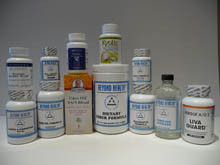Posted by Beyond Health on Nov 3rd 2025
I recently received my blood work and I have low Vitamin D and Calcium. In addition, I have a low white blood cell count. I thought taking Magnesium would be helpful?
One cause of low serum calcium is a Vitamin D deficiency. Therefore, since your Vitamin D is low, this might be the reason that your Calcium is low too? To address the Calcium deficiency, I recommend that you take 3-4 tablets (split) of our Bone Mineral Formula. In addition, to correct a vitamin D deficiency, you should take 5,000 IU to 10,000 IU a day (that would be 10-20 drops of the liquid D3). There is no need to supplement extra Magnesium to address this issue. As Vitamin D deficiency could be an indirect cause of a low white blood count, I will defer to your physician as there are so many reasons it could be low.…
 Fuel your life with the purest vitamins
Fuel your life with the purest vitamins












